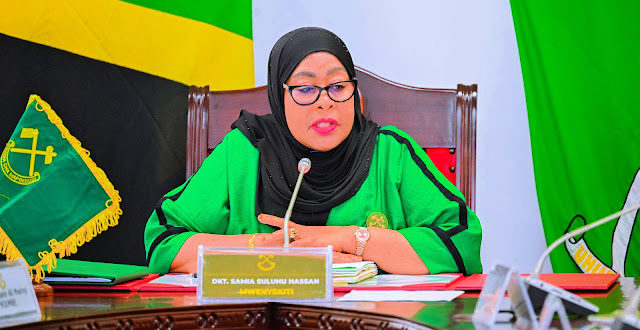Prime
What to expect as CCM shortlists election contenders

The CCM national chairperson, President Samia Suluhu Hassan, chairs a CCM Central Committee meeting in Dodoma on January 17, 2025. PHOTO | FILE
What you need to know:
- The ruling party is on Monday expected to unveil its shortlist of parliamentary and Zanzibar House of Representatives contenders ahead of the 2025 General Election
Dar es Salaam. The ruling CCM convenes a crucial meeting of its Central Committee (CC) on Monday when it is expected to unveil its shortlist of parliamentary and Zanzibar House of Representatives contenders ahead of the 2025 General Election.
Political analysts say the meeting will offer a revealing glimpse into how the ruling party is balancing loyalty, merit, diversity and regional equity in an era of heightened internal democracy.
This year’s nomination process is unlike any before. Under a newly revised party constitution, the Central Committee has been granted expanded powers to shortlist more than three aspirants per constituency—departing from previous cycles where the ceiling was rigid.
The change comes as CCM grapples with unprecedented levels of political engagement. More than 20,000 applications have been submitted by aspiring candidates across the country—a figure party officials say reflects growing internal enthusiasm spurred by expanded voting structures.
According to Article 105(7)(f) of the May 2025 edition of the CCM Constitution, the Central Committee now holds discretionary powers to shortlist more than three aspirants per seat, where necessary. The flexibility aims to preserve fairness and order in constituencies with particularly large pools of contenders.
The CCM national chairperson, President Samia Suluhu Hassan, has publicly defended the reforms, saying they were necessary to match the scale of democratic participation now unfolding within CCM.
“We expanded democracy by increasing the number of voting delegates, and this has encouraged more members to seek leadership positions. In some constituencies, there are as many as 40 aspirants. Narrowing them to just three is impractical,” she said.
Her remarks followed a special party congress held online earlier this month, where 912 out of 915 voting delegates approved the constitutional amendments—representing a 99.8 percent endorsement.
Further reforms include amendments to Article 91(6)(c), which governs the nomination of local councillors, giving regional organs more leeway in selecting viable candidates.
CCM National Executive Council secretary Issa Haji Gavu said the changes reflect a strategic response to internal demand and logistical realities.
“We are witnessing an unprecedented level of enthusiasm from members. These reforms ensure the party can respond to that energy in a way that preserves stability. It also helps avoid sidelining strong candidates due to arbitrary limitations,” he said
As today’s CC meeting gets underway, political analysts are watching closely to see how CCM deploys its new constitutional tools.
A political analyst from the University of Dar es Salaam, Dr Onesmo Kyauke, anticipates that constituencies with large numbers of aspirants will see longer shortlists.
“Where 30 or 40 candidates are vying for a single seat, limiting the shortlist to just three is politically risky. The party is likely to adopt a more inclusive approach to preserve internal harmony,” he said.
However, some analysts warn that expanded discretion must be exercised transparently.
Dr Revocatus Kabobe from the Open University of Tanzania cautioned that too much centralised control could backfire.
“There is a risk that these new powers could be used to reward loyalty over competence,” he said.
“Today will be a test of whether the Central Committee prioritises fairness or reinforces perceptions of elite control.”
Prof Makame Ali Ussi from the State University of Zanzibar viewed the reforms more positively, describing them as signs of institutional maturity.
“This is an important moment in CCM’s structural evolution. The party is showing that it can adapt to political realities without abandoning its ideological base,” he said.
Dr Faraja Kristomus of the University of Dar es Salaam urged the leadership to remain accountable to the grassroots.
“If the Central Committee routinely overrides local preferences, the credibility of the nomination process will suffer. Transparency must be a priority,” she said.
Dr Richard Mbunda, also from UDSM, said the process will test CCM’s ability to balance top-down management with bottom-up participation.
“Today’s meeting highlights the internal tension between democratic engagement and institutional control. The outcome will reflect how well the party can manage dissent while honouring its grassroots base,” he noted.
Dr Paul Loisulie from the University of Dodoma called the shortlist a defining moment in the party’s evolution.
“This is not just a procedural meeting—it’s a strategic inflection point. The names released today will show how committed the party is to deepening internal democracy, and whether it’s prepared to embrace both reform and discipline,” he said.
Once shortlisted, candidates will proceed to internal party opinion polls, where thousands of CCM members will cast votes to determine final nominees for the 2025 elections.





